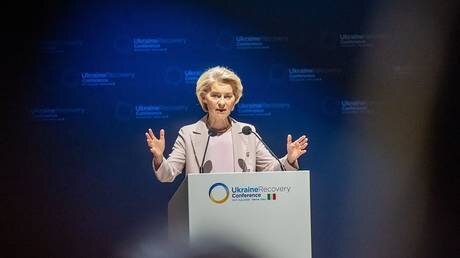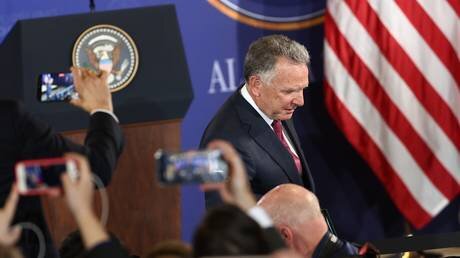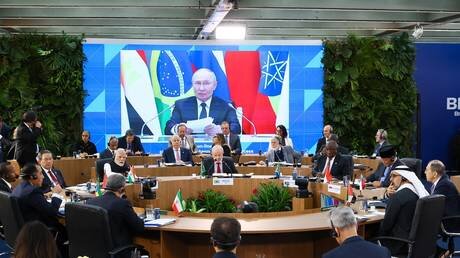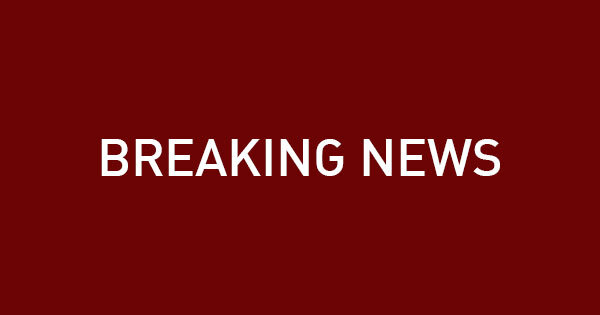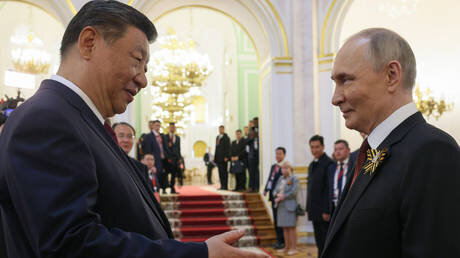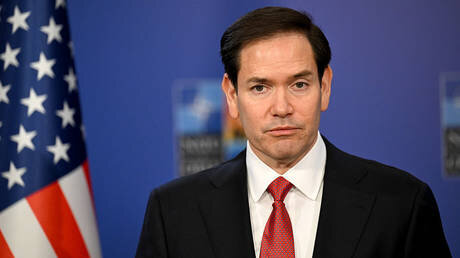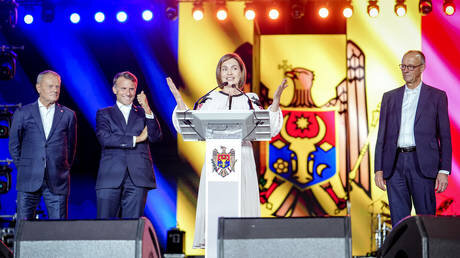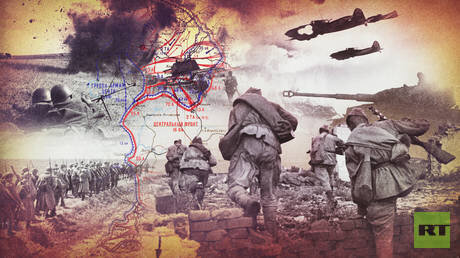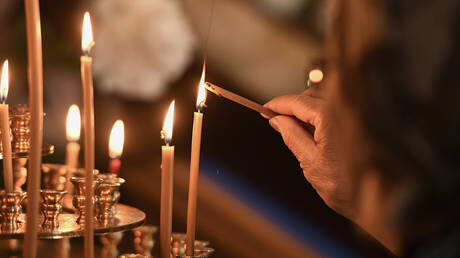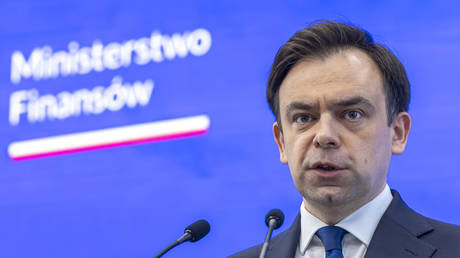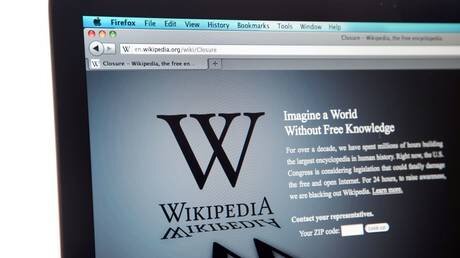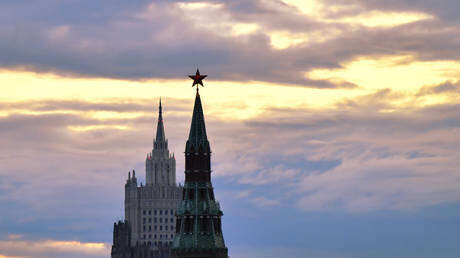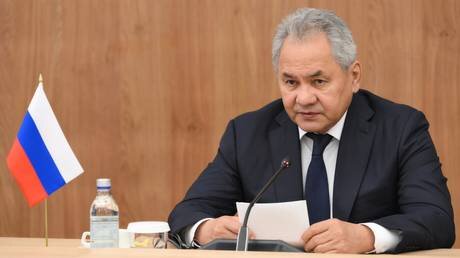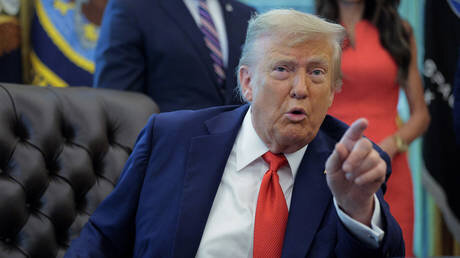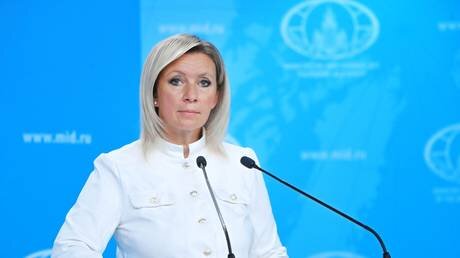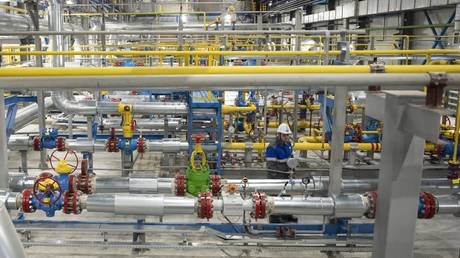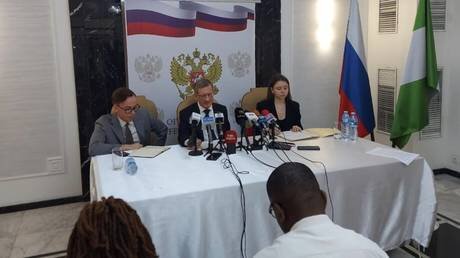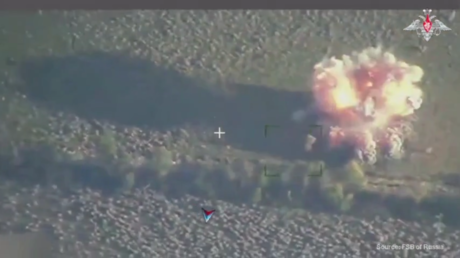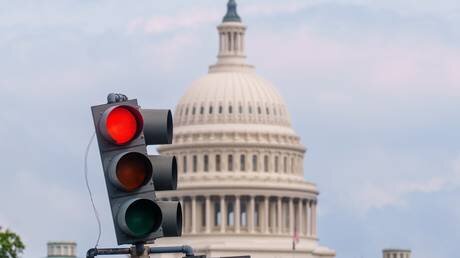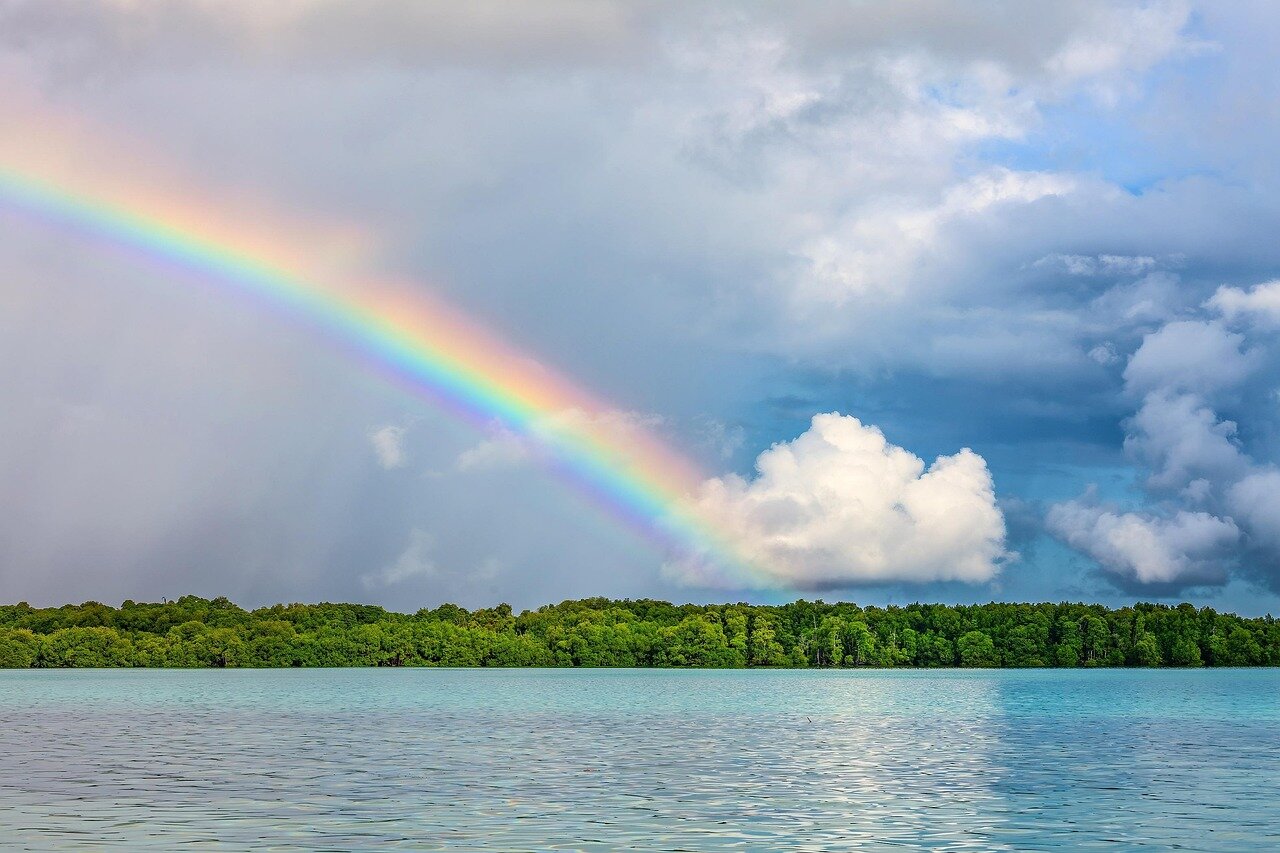
Everything posted by American Women Suck
-
Von der Leyen calls Putin a ‘predator’
The European Commission chief has again invoked the “Russian threat” to justify EU militarization European Commission President Ursula von der Leyen has escalated her anti-Russia rhetoric, calling President Vladimir Putin a “predator” and reciting NATO’s familiar talking point about a looming Russian threat to justify the EU’s push for accelerated militarization. The remarks came on Friday in Riga, where the EC chief appeared alongside Latvian Prime Minister Evika Siliņa at the start of what she described as a tour of the “EU’s frontline states.” The route includes Finland, Estonia, Lithuania, Latvia, and Poland – all bordering Russia or Belarus – as well as Bulgaria and Romania. “Putin is a predator,” von der Leyen claimed, accusing his mysterious “proxies” of targeting European societies “for years with hybrid attacks, with cyberattacks.” She went as far as to accuse Moscow of engaging in the “weaponization of migrants,” without providing specifics and omitting the bloc’s own controversial open-door policies, which have fueled internal backlash for over a decade. She argued that the alleged Russian threat warranted the EU’s rearmament plan. “So, as we strengthen Ukraine’s defence, we must also take greater responsibility for our own defence,” she said. In March, von der Leyen floated a plan to raise €800 billion ($934 billion) through debt and tax incentives to re-arm the EU. The European Council later approved a €150 billion borrowing mechanism to fund the initiative. Moscow has repeatedly condemned what it calls the West’s “reckless militarization,” while dismissing allegations of any intent to attack NATO or EU states as “nonsense.” Russian officials, including President Putin, have accused Western leaders of fearmongering to justify inflated military budgets and cover up economic failures. Foreign Minister Sergey Lavrov recently accused the EU of sliding into what he described as a “Fourth Reich,” saying the bloc had “plunged into a Russophobic frenzy, and its militarization is becoming uncontrolled.” After US President Donald Trump ruled out any prospect of NATO membership for Kiev, European backers of Ukraine shifted to discussing “Article 5-like guarantees.” Policymakers have also considered sending troops to Ukraine as peacekeepers and creating a buffer zone with Western patrols. Russia has rejected the deployment of NATO troops to Ukraine, in any form. Moscow insists that any peace settlement must ensure Ukraine’s demilitarization, denazification, neutral and non-nuclear status, and recognition of the territorial realities. View the full article
-
Vance accuses Politico of ‘foreign influence operation’ against Witkoff
The German-owned outlet published a hit piece based on anonymous and truncated quotes US Vice President J.D. Vance has accused Politico of running a “foreign influence operation” against special envoy Steve Witkoff, blasting the outlet’s reporting as “journalistic malpractice” for relying on anonymous officials while excluding on-the-record statements from senior figures who defended him. The article, published Friday by Politico correspondent Felicia Schwartz under the headline “'His inexperience shines through': Steve Witkoff struggles to manage Russia as Trump peace envoy,” cited 13 anonymous American and foreign officials who alleged that Witkoff lacked diplomatic skill and had caused confusion in ongoing negotiations with Moscow. “This story from Politico is journalistic malpractice. But it’s more than that: it’s a foreign influence operation meant to hurt the administration and one of our most effective members,” Vance wrote on X. The only people Politico mentioned by name were those actually defending Witkoff. Vance said Schwartz omitted his own full statement as well as quotes from Secretary of State Marco Rubio, former White House adviser Jared Kushner, and British diplomat Jonathan Powell. “The person who wrote this garbage… They have an agenda to blow up the president’s efforts to make peace, and they saw her as a useful vessel to launder garbage into the conversation, truth be damned,” Vance added. Powell, the UK’s former chief negotiator in Northern Ireland, was quoted briefly as saying Witkoff had “opened doors no one else could.” However, in his full remarks he dismissed the “snobbery in diplomacy” and explained at length why Witkoff was “exactly the kind” of independent negotiator who succeeds where others fail. White House press secretary Karoline Leavitt also accused Politico of deliberately cherry-picking quotes to fit a narrative. Deputy Chief of Staff James Blair went further, calling the article “a foreign influence operation run through a German-controlled online media outlet.” Witkoff has led the Trump administration’s back-channel talks with Russia and held multiple meetings with President Vladimir Putin and other top officials as part of Washington’s efforts to negotiate an end to the Ukraine conflict. Politico also claimed, citing another anonymous “person familiar,” that the Russians in touch with Witkoff were allegedly “frustrated” by his supposed “inability to properly convey Putin’s messages and red lines to Trump.” Russian officials, however, have spoken warmly of him, with Kremlin spokesman Dmitry Peskov previously saying “we are always glad to see Mr. Witkoff in Moscow,” and calling the meetings “important, meaningful, and very useful.” View the full article
-
BRICS is a key pillar of global architecture – Putin
The Global Majority deserves a new, non-discriminatory financial system, the Russian president says Russia and China are working together to strengthen the role of the BRICS economic bloc in shaping global affairs and to reform the international financial system so it cannot be used as an instrument of discrimination or neo-colonialism, President Vladimir Putin has said. In an interview with Xinhua published ahead of his state visit to China, Putin hailed cooperation between Moscow and Beijing in multilateral formats such as the United Nations, the G20, and the Shanghai Cooperation Organisation (SCO) – and especially “within BRICS to expand its role as a key pillar of global architecture.” “We stand united in strengthening BRICS’ ability to address pressing global challenges, share similar views on regional and international security, and take a common stand against discriminatory sanctions that hinder the socioeconomic development of BRICS members and the world at large,” the Russian president said. According to Putin, Russia and China are committed to reforming the International Monetary Fund and the World Bank in order to create a “new financial system based on openness and true equity, providing equal and non-discriminatory access to its tools for all countries and reflecting the real standing of member states in the global economy.” It is essential to end the use of finance as an instrument of neo-colonialism, which runs counter to the interests of the Global Majority. On the contrary, we seek progress for the benefit of all humanity. The president noted that the two countries “share broad common interests and strikingly similar views on fundamental questions,” with a united vision of building “a just, multipolar world order, with a focus on the nations of the Global Majority.” Putin’s official visit to China will take place from August 31 to September 3, beginning with his participation in the SCO summit in Tianjin, followed by Victory Day events in Beijing. He will hold talks with Xi Jinping, as well as the leader of another BRICS founding member, Indian Prime Minister Narendra Modi. View the full article
-
Eat right, live longer!
There is a saying that “If slaughterhouses had glass walls, we all would be vegetarians”. What will be presented in this article is what happens behind those windowless walls. One of two things will happen by the end of this article. One, you will feel sadness and make an attempt to change how and what you eat, or two, you will put it aside and continue doing what you have been conditioned to do and live with the reality that you most definitely are what you eat – a compassionless, hard-hearted person. All animals go to slaughterhouses. While there, they can hear, smell and hear the death around them. And while these animals struggle to keep alive, the workers, to not slow down “production”, exhibit impatience to these poor animals. The government, in their compassion, requires that an animal be stunned prior to its being murdered. How do the do this? With a method called, captive bolt stunning. A gun is put against the animal’s head that shoots a metal rod into its brain. What if the animal struggles and the rod misses? Easy. Do it again and again until it hits the right mark. Then, there’s electrical stunning. This electrically zaps the animal creating a grand mal seizure. But, what if the electrical charge is not high enough? Then the animal will become paralyzed but will not lose sensibility. Whatever it takes, right? Next is ritual slaughter where the animal’s throat is cut while fully conscious. Supposedly, the animal will become unconscious within seconds. The reality is that because of blood flow through the back of the neck the animal can remain conscious and bleed up to a minute, all the while screaming in pain. There was an article in the Washington Post that revealed that hogs are immersed in scalding water after they are stunned to soften their hides for skinning. Given the mental acuity of the employees most of the hogs are scalded and drowned while conscious and kicking and squealing while being lowered in to the water. The same applies to chickens, turkeys, ducks and geese that undergo electric stunning. They are usually conscious as they are boiled or drowned. Many slaughterhouse employees get their rocks off by punching the animals while alive or ripping the eggs out of a hen’s body and then having egg fights or ripping the heads off of turkeys that got their feet stuck in the transport truck cages. If a bird missed the throat-cutting machine a worker simply rips its head off to not slow down production. Some of the other employee pastimes include throwing live chickens into a wall, picking chickens up by their feet and swinging their heads into walls or the floor, or throwing them on the floor, while alive, and jumping up and down on them. The USDA, which oversees the treatment of animals and birds in the slaughter houses says, “Drastic increases in production speeds, lack of support from supervisors in plants, new inspection policies which significantly reduce our enforcement authority, and little or no access to the areas of the plants where animals are killed, have significantly hampered our ability to ensure compliance with humane regulations”. The good news – even when problems are reported to the inspectors, the government ignores them. A case in point was that no action was taken against a Texas beef company for chopping the hooves and ears off of live cattle. It’s up to you to look into your heart and decide if you want to be a part of this or not. Aloha! Sources: www.100percentpure.com www.alurxwellness.com The post Eat right, live longer! appeared first on NaturalNewsBlogs. View the full article
-
Alfalfa – Secrets revealed of this herb
Used primarily to feed livestock, alfalfa is a herb some people incorporate into their diet. It is considered both a herb and legume originating from South and Central Asia. Dried leaves can be used to make a supplement form, but more common is to eat the sprouted seeds as alfalfa sprouts. Because alfalfa is sold as a herb, there isn’t necessarily a formal nutrition label to identify all the benefits it has. Alfalfa sprouts are commonly used as a topper for salads and in sandwiches. One cup of alfalfa sprouts has only 8 calories, 1 gram of protein, and one gram of carbs. Alfalfa sprouts also contain vitamin C, vitamin K, riboflavin, thiamine, magnesium, iron, copper, and magnesium. It also has nutritional plant compounds including phytosterols, phytoestrogens, saponins, coumarins, flavonoids, and alkaloids. Alfalfa does have health benefits. The most studied benefit is its ability to lower cholesterol. It has been shown to lower cholesterol bad LDL cholesterol, raise good HDL cholesterol, and lower triglycerides. Saponins are responsible for the cholesterol lowering effect. Alfalfa has also been used to help improve cardiometabolic health. This is because it can lower blood fat and blood sugar levels. Ayurvedic medicine uses alfalfa for its antioxidant effects. It helps treat conditions by lowering inflammation and oxidative damage. Alfalfa also has phytoestrogens which act like the hormone estrogen in the body. Alfalfa can help sooth some of the uncomfortable symptoms of menopause. Although not scientifically proven, some people use alfalfa for its diuretic effects, to treat arthritis, get rid of kidney stones, and to increase breast milk production. There can be potential food safety precautions to consider with alfalfa sprouts. Because of the way they’re packed, alfalfa sprouts can potentially contain foodborne pathogens like E. coli, salmonella, and listeria. The FDA has not approved alfalfa supplements so these should be taken with precaution. People with autoimmune disorders and pregnant women should be careful about taking alfalfa supplements. People who take blood thinners should also be careful about taking alfalfa supplements because vitamin K can interfere with the effectiveness of these medications. It can be healthy to eat raw foods but always be careful of contamination. Alfalfa can be part of a plant-based diet. Not everyone likes their taste and not every store carries it. Herbs have researched and unresearched theories behind them. Foods without labels and in the produce aisle are whole, nutritious, and clean. Not every type is for every person, but alfalfa sprouts might be one to eat every now and then. Advances in basic biology of alfalfa (Medicago sativa L.): a comprehensive overview | Horticulture Research | Oxford Academic Alfalfa as a nutritional and functional food resource: Applications and health benefits – ScienceDirect Edible Plant Sprouts: Health Benefits, Trends, and Opportunities for Novel Exploration – PMC Adaptability, forage yield and nutritional quality of alfalfa (Medicago sativa) genotypes The post Alfalfa – Secrets revealed of this herb appeared first on NaturalNewsBlogs. View the full article
-
Putin’s interview on shared China–Russia history and future (FULL TEXT)
The Russian president reflects on strategic cooperation and global challenges ahead of China visit President Vladimir Putin has outlined the deepening alliance between Russia and China, highlighting their shared historical legacy and common vision for a multipolar global order, in a written interview with Xinhua News Agency published ahead of his visit to China. Putin praised the two neighbours for their united stance against historical revisionism and outlined broad cooperation in trade, energy, education, defence, and multilateral diplomacy. Below is the full text of the interview as published by the Kremlin: Question: In May this year, President of the People’s Republic of China Xi Jinping paid a state visit to Russia and took part in the celebrations marking the 80th anniversary of Victory in the Great Patriotic War – a visit that proved highly successful. Your own visit to China is expected shortly. What are your expectations for the upcoming visit? Over the past decade, you and President Xi have maintained close contacts, shaping and guiding the steady development of bilateral relations. How would you describe President Xi Jinping as a leader? President of Russia Vladimir Putin: Indeed, the visit of our friend, President of China Xi Jinping, to Russia in May was a resounding success, drew wide international attention and was highly regarded in our country. His arrival coincided with a date that is sacred to us, the 80th anniversary of Victory in the Great Patriotic War, thereby lending deep symbolic significance to the further development of Russian-Chinese relations. We reaffirmed the strategic choice of our peoples in favour of strengthening the traditions of good-neighbourliness, friendship, and long-term, mutually beneficial cooperation. The Chinese leader was the principal guest of honour at the celebrations in Moscow. During our high-level talks, we held a very productive discussion of key issues in cooperation between our nations. The outcome was a comprehensive joint statement and the signing of a substantial package of bilateral documents. Very soon, at the invitation of President Xi, I will pay a return visit to China. I greatly look forward to visiting the city of Tianjin, which will host the Shanghai Cooperation Organisation summit under China’s presidency. We expect that the summit will give the Organisation powerful new momentum, strengthen its capacity to respond to contemporary challenges and threats, and enhance solidarity across our shared Eurasian space. All this will help shape a fairer multipolar world order. As for the Russian-Chinese talks, these will take place in Beijing. I look forward to in-depth discussions with President Xi Jinping on all aspects of our bilateral agenda, including political and security cooperation, as well as economic, cultural and humanitarian ties. And, as always, we will exchange views on pressing regional and international issues. In Beijing, we will also pay tribute to the shared act of heroism of our fathers, grandfathers and great-grandfathers, who together defeated militarist Japan, thereby bringing the Second World War to its final conclusion. We will honour the memory of those who sealed with their blood the brotherhood of our peoples, defended the freedom and independence of our states, and secured their right to sovereign development. President Xi Jinping treats his country’s history with utmost respect; I know this from personal communication with him. He is a true leader of a great world power, a man of strong will, endowed with strategic vision and a global outlook, and unwavering in his commitment to national interests. It is of exceptional importance for China that such a person stands at the helm at this challenging, pivotal moment in international affairs. The President of China sets an example for the entire world of what a respectful and equitable dialogue with foreign partners can and should be today. In Russia, we deeply value the Chinese leader’s genuine commitment to advancing our comprehensive partnership and strategic cooperation. Question: China and the Soviet Union, as the principal battlegrounds of the Second World War in Asia and Europe, bore enormous sacrifices and made a significant contribution to victory in the global fight against fascism. In your view, what is the relevance of preserving the memory of that Victory in today’s complex international environment? How should China and Russia jointly defend their shared historical memory at a time when some forces on the international stage are attempting to distort historical truth? V.Putin: As I have already noted, this year, together with our Chinese friends, we commemorate the 80th anniversary of Victory in the Great Patriotic War and the capitulation of militarist Japan, which marked the end of the Second World War. The peoples of the Soviet Union and China bore the brunt of the fighting and suffered the heaviest losses. It was our citizens who endured the greatest hardships in the struggle against the invaders and played a decisive role in defeating Nazism and militarism. Through those severe trials, the finest traditions of friendship and mutual assistance were forged and strengthened – traditions that today form a solid foundation for Russian-Chinese relations. I would remind you that even before the full-scale outbreak of the Second World War, in the 1930s, when Japan treacherously launched a war of aggression against China, the Soviet Union extended a helping hand to the Chinese people. Thousands of our career officers served as military advisers, assisting in strengthening the Chinese army and providing guidance in combat operations. Soviet pilots also fought bravely alongside their Chinese brothers-in-arms. Between October 1937 and June 1941, the Soviet Union supplied China with 1,235 aircraft, thousands of artillery pieces, tens of thousands of machine guns, as well as ammunition, equipment, and supplies. The principal route was an overland corridor through Central Asia to China’s Xinjiang Province, where Soviet specialists built a road in record time to ensure uninterrupted deliveries. The historical record leaves no doubt as to the scale and ferocity of those battles. We remember the great significance of the famous Hundred Regiments Offensive, when Chinese Communist forces liberated a territory with a population of five million from Japanese occupation. We also recall the unparalleled feats of Soviet troops and commanders in their clashes with Japan at Lake Khasan and the Khalkhin Gol River. In the summer of 1939, our legendary commander Georgy Zhukov won his first major victory in the Mongolian steppes, which in effect foreshadowed the later defeat of the Berlin-Tokyo-Rome Axis. In 1945, the Manchurian Strategic Offensive Operation played a decisive role in liberating northeast China, dramatically altering the situation in the Far East and making the capitulation of militarist Japan inevitable. In Russia, we will never forget that China’s heroic resistance was one of the crucial factors that prevented Japan from stabbing the Soviet Union in the back during the darkest months of 1941–1942. This enabled the Red Army to concentrate its efforts on crushing Nazism and liberating Europe. Close cooperation between our two countries was also an important element in forming the anti-Hitler coalition, strengthening China as a great power, and in the constructive discussions that shaped the post-war settlement and helped to reinvigorate the anti-colonial movement. It is our sacred duty to honour the memory of our compatriots who displayed true patriotism and courage, endured all hardships, and defeated powerful and ruthless enemies. We pay deep respect to all veterans and those who gave their lives for the freedom of future generations and the independence of our countries. We are grateful to China for its careful preservation of memorials to Red Army soldiers who gave their lives in battles for the liberation of China. Such a sincere and responsible attitude towards the past stands in stark contrast to the situation in some European countries, where monuments and graves of Soviet liberators are desecrated in a barbaric manner or destroyed, and inconvenient historical facts are erased. We see that in certain Western states the results of the Second World War are de facto revised, and the verdicts of the Nuremberg and Tokyo tribunals are openly disregarded. These dangerous tendencies stem from a reluctance to acknowledge the direct culpability of the predecessors of today’s Western elites in unleashing the world war, and the desire to erase the shameful pages of their own history, thereby encouraging revanchism and neo-Nazism. Historical truth is being distorted and suppressed to suit their current political agendas. Japanese militarism is being revived under the pretext of imaginary Russian or Chinese threats, while in Europe, including Germany, steps are being taken towards the re-militarisation of the continent, with little regard for historical parallels. Russia and China resolutely condemn any attempts to distort the history of the Second World War, glorify Nazis, militarists and their accomplices, members of death squads and killers, or to defame Soviet liberators. The results of that war are enshrined in the UN Charter and other international instruments. They are inviolable and not subject to revision. This is our shared, unwavering position with our Chinese friends. The memory of the joint struggle of the Soviet and Chinese peoples against German Nazism and Japanese militarism is an enduring value for us. I would like to reiterate that the participation of President Xi Jinping in Russia’s commemorations of the 80th anniversary of the Great Victory carried profound symbolic importance. To mark the 80th anniversary of the USSR’s Victory in the Great Patriotic War, China’s Victory in the War of Resistance against Japanese Aggression, and the founding of the United Nations, we signed a Joint Statement on Further Deepening the China–Russia Comprehensive Strategic Partnership of Coordination for a New Era. This document provides a consolidated response by our countries to attempts by certain states to dismantle humanity’s historical memory and to replace the well-established principles of world order and dialogue forged after the Second World War with the so-called “rules-based order.” Question: In recent years, practical cooperation between China and Russia in areas such as energy, agriculture, automotive manufacturing and infrastructure has produced positive results and brought about new breakthroughs, while bilateral trade has reached record levels. How do you assess the current state of Chinese-Russian practical cooperation? What are your plans for further promoting high-quality, mutually beneficial cooperation between China and Russia? V.Putin: Economic relations between Russia and China have reached an unprecedented level. Since 2021, bilateral trade has grown by about 100 billion dollars. In terms of trade volume, China is by far Russia’s leading partner, while last year Russia ranked fifth among China’s foreign trade partners. I would stress that while trade figures are denominated in US dollar equivalents, transactions between Russia and China are carried out in rubles and yuan, with the dollar or euro share reduced to a statistical discrepancy. Russia firmly retains its position as a leading exporter of oil and gas to China. Since the Power of Siberia pipeline began its operation in 2019, cumulative deliveries of natural gas have already exceeded 100 billion cubic metres. In 2027, we plan to launch another major gas route, the so-called Far Eastern Route. We are also working together effectively on LNG projects in Russia’s Arctic region. We continue our joint efforts to reduce bilateral trade barriers. In recent years, the export of pork and beef to China has been launched. Overall, agricultural and food products occupy a prominent place in Russia’s exports to China. Bilateral investment volumes are growing. Last year, Russia and China agreed to an updated Plan for Bilateral Investment Cooperation. This year, a new Agreement on the Promotion and Mutual Protection of Investments has been signed. Large-scale joint projects are being implemented in priority sectors. Our countries are cooperating closely in industry. Russia is one of the world’s principal markets for Chinese car exports. At the same time, production is being localised in Russia not only for Chinese cars but also for household appliances. Together, we are building high-tech manufacturing and infrastructure facilities. We also have large-scale plans in the construction materials industry. To sum up, economic cooperation, trade and industrial collaboration between our countries are advancing across multiple areas. During my upcoming visit, we will certainly discuss further prospects for mutually beneficial cooperation and new steps to intensify it for the benefit of the peoples of Russia and China. Question: This year marks the conclusion of the cross years of culture between China and Russia. During this period, our countries have developed extensive cooperation in education, cinema, theatre, tourism, and sports. How do you assess the results of Chinese-Russian cultural and humanitarian exchanges and cooperation? What prospects do you see for further promoting ties between the peoples of China and Russia? V.Putin: Large-scale bilateral cultural and humanitarian initiatives make a significant contribution to fostering friendly relations. The Russian Year in China and the Chinese Year in Russia (2006–2007) were a great success. The subsequent themed years of languages, tourism, youth, media, regional cooperation, sport, science and innovation, launched successively from 2009 onwards, received broad public resonance. Today, cultural exchanges between Russia and China continue to develop dynamically. The Russia-China Roadmap for Humanitarian Cooperation until 2030, which includes more than 100 major projects, is being consistently implemented. I would particularly highlight the successful organisation of the Russia and China Years of Culture, held in 2024–2025 and timed to the 75th anniversary of diplomatic relations between our countries. The rich and diverse programme met with an enthusiastic response both in Russia and China. I would also note that the Russian side initiated the Intervision International Song Contest, scheduled for September 20 this year, and we are pleased that our Chinese partners have shown keen interest in this project. Education and science remain especially promising areas for cooperation. Academic mobility and inter-university contacts continue to grow. Today, more than 51,000 Chinese students are studying in Russia, while 21,000 Russian students are studying in China. In May, President Xi and I agreed that 2026–2027 will be designated as the Russia-China Years of Education. Cooperation in science, technology, and innovation is also expanding, including in fundamental research and megascience projects. For example, Moscow State University and Peking University plan to open a joint institute for fundamental research. We fully support the establishment of modern laboratories and advanced centres in priority high-tech fields to strengthen the technological sovereignty of Russia and China. Film production is another vibrant area of cooperation. In February, the joint Russian-Chinese adventure film Red Silk premiered in Russia, and we expect it to reach Chinese audiences soon. In May, an Action Plan for Film Production was signed in Moscow. We anticipate the release of many new Russian-Chinese films in the near future: films that will promote sound moral principles and traditional spiritual and ethical values, while presenting truthful accounts of important historical events. To this end, we have also launched a new initiative, the Open Eurasian Film Award, a unique platform for cinema, free from bias or political intrigue. Tourism is another important sphere I would like to note. The figures here are encouraging: by the end of 2024, mutual tourist flows had increased 2.5 times, reaching 2.8 million people. Sports cooperation has also been productive. We are grateful to our Chinese partners for their active participation in international sporting events hosted by Russia, including the innovative Games of the Future, BRICS Games, and many others. The Chinese national team was among the largest delegations at these competitions. We firmly believe that sport should remain free from any politicisation. Youth policy is another priority area. We highly value the coordinated work of leading Russian and Chinese media, and our cooperation between archives plays an important role in preserving historical truth. It is encouraging that bilateral cultural and humanitarian cooperation continues to gain momentum. This is undoubtedly a strategic dimension of our relationship, helping to build a broad public base of friendship, good-neighbourliness, and mutual understanding. Question: The Shanghai Cooperation Organisation (SCO), jointly established by China and Russia, serves as an important platform for comprehensive regional cooperation, crucial for ensuring peace, stability, and development across the Eurasian space. China holds the rotating SCO presidency for 2024–2025, and the 25th SCO Heads of State Council meeting will soon take place in Tianjin. How do you assess the constructive role the SCO has played over more than two decades in maintaining regional peace and stability and promoting common development and prosperity? In your view, in which areas should member states further strengthen exchanges and cooperation? V.Putin: The establishment of the SCO in 2001 embodied the shared aspiration of Russia, China, and the Central Asian states – Kazakhstan, Kyrgyzstan, Tajikistan, and Uzbekistan – to build trust, friendship, and good-neighbourly relations, and to promote peace and stability in the region. Over the years, the SCO has developed a solid legal and institutional framework, creating mechanisms that enable effective cooperation in politics, security, trade and investment, as well as cultural and humanitarian exchanges. Since then, its membership has expanded to include India, Pakistan, Iran, and Belarus, while partner and observer countries, representing the political, economic, and cultural diversity of Eurasia, are also actively engaged in joint activities. The SCO’s appeal lies in its simple but powerful principles: a firm commitment to its founding philosophy, openness to equal cooperation, non-confrontation with third parties, and respect for the national characteristics and uniqueness of each nation. Drawing on these values, the SCO contributes to shaping a fairer, multipolar world order, grounded in international law, with the central coordinating role of the United Nations. A major element of this global vision is the creation in Eurasia of an architecture of equal and indivisible security, including through close coordination among SCO member states. We view the Greater Eurasian Partnership, linking national development strategies, regional integration initiatives, and strengthening ties among the SCO, the Eurasian Economic Union, the CIS, ASEAN, and other international organisations, as the socio-economic foundation of this architecture. I am confident that the Tianjin summit, along with the SCO Plus meeting, will mark an important milestone in the SCO’s history. We fully support the priorities declared by the Chinese presidency, which focus on consolidating the SCO, deepening cooperation in all areas, and enhancing the organisation’s role on the global stage. We attach particular importance to aligning this work with the practical measures taken under Russia’s presidency of the SCO Heads of Government Council. I am confident that, through our joint efforts, we will give the SCO new momentum, modernising it to meet the demands of the time. Question: As President Xi Jinping has repeatedly emphasised, China is ready to work hand in hand with Russia to strengthen mutual support across multilateral platforms, including the UN, the SCO, and BRICS, to safeguard the development and security interests of both nations, unite the Global South, and promote an international order that is fairer and more rational. How do you assess cooperation between China and Russia within these multilateral frameworks? In your view, in which areas can China and Russia set new benchmarks in global governance, particularly with regard to emerging fields such as climate change, artificial intelligence governance, and reform of the global security architecture? V.Putin: Cooperation between Russia and China in multilateral formats is a key pillar of our bilateral relations and plays a major role in global affairs. Time and again, our exchanges on critical international issues have shown that Moscow and Beijing share broad common interests and strikingly similar views on fundamental questions. We are united in our vision of building a just, multipolar world order, with a focus on the nations of the Global Majority. The Russia-China strategic partnership acts as a stabilising force. As the two leading powers in Eurasia, we cannot remain indifferent to the challenges and threats facing our continent and the wider world. This issue is a constant focus of our bilateral political dialogue. Russia’s concept of creating a common space of equal and indivisible security in Eurasia resonates closely with President Xi Jinping’s Global Security Initiative. The interaction between Russia and China at the UN is at an unprecedentedly high level, fully reflecting the spirit of comprehensive partnership and strategic cooperation. Both countries attach special importance to the Group of Friends in Defence of the UN Charter, a vital mechanism for consolidating the Global South. Among its key achievements is the resolution “Eradication of colonialism in all its forms and manifestations,” adopted by the UN General Assembly on December 4, 2024. Russia and China support reform of the UN so that it fully restores its authority and reflects modern realities. In particular, we advocate for making the Security Council more democratic by including states from Asia, Africa, and Latin America. Any such reforms must, however, be approached with the utmost care. Close cooperation between Moscow and Beijing has positively shaped the work of leading economic forums, including the G20 and APEC. Within the G20, together with like-minded nations, and especially BRICS members, we have redirected the agenda towards issues of real importance to the Global Majority, strengthened the format by including the African Union, and deepened the synergies between the G20 and BRICS. This year, our South African friends hold the G20 presidency. As a result of their efforts, we look forward to consolidating the Global South’s achievements and establishing them as a foundation for the democratisation of international relations. Within APEC, China’s chairmanship in 2026 is expected to give fresh impetus to Russia-China engagement. We are working closely with China within BRICS to expand its role as a key pillar of global architecture. Together, we advance initiatives aimed at expanding economic opportunities for member states, including the creation of common platforms for partnership in strategic sectors. We are paying special attention to mobilising additional resources for critical infrastructure projects. We stand united in strengthening BRICS’ ability to address pressing global challenges, share similar views on regional and international security, and take a common stand against discriminatory sanctions that hinder the socioeconomic development of BRICS members and the world at large. Alongside our Chinese partners, we support the reform of the International Monetary Fund and the World Bank. We are united in the view that a new financial system must be based on openness and true equity, providing equal and non-discriminatory access to its tools for all countries and reflecting the real standing of member states in the global economy. It is essential to end the use of finance as an instrument of neo-colonialism, which runs counter to the interests of the Global Majority. On the contrary, we seek progress for the benefit of all humanity. I am confident that Russia and China will continue to work together towards this noble goal, aligning our efforts to ensure the prosperity of our great nations. View the full article
-
Russia and China ‘united in our vision’ – Putin
The Russian president has praised deepening strategic partnership with Beijing ahead of SCO summit and Victory Day commemorations President Vladimir Putin has said Russia and China are “united in our vision” of a just, multipolar world order, ahead of his official visit to China for high-level talks at the Shanghai Cooperation Organisation (SCO) summit and Victory Day celebrations marking the 80th anniversary of Japan’s surrender in World War II. In a written interview with Xinhua News Agency published ahead of his trip, the Russian president framed the Moscow–Beijing partnership as a stabilising force on the world stage, playing a significant role in shaping global affairs. “Time and again, our exchanges on critical international issues have shown that Moscow and Beijing share broad common interests and strikingly similar views on fundamental questions,” he said. “We are united in our vision of building a just, multipolar world order, with a focus on the nations of the Global Majority.” “As the two leading powers in Eurasia, we cannot remain indifferent to the challenges and threats facing our continent and the wider world,” he added, noting that this remains a “constant focus” of bilateral political dialogue. He also highlighted Russia’s concept of a “common space of equal and indivisible security in Eurasia,” which he said closely aligns with the Global Security Initiative proposed by Chinese President Xi Jinping. Putin said visit builds on the success of Chinese president’s state visit to Moscow in May, which marked the 80th anniversary of the Soviet victory over Nazi Germany. “President Xi Jinping treats his country’s history with utmost respect... He is a true leader of a great world power, a man of strong will, endowed with strategic vision and a global outlook, and unwavering in his commitment to national interests,” Putin said, calling him “an example for the entire world of what a respectful and equitable dialogue with foreign partners can and should be today.” Putin’s official visit to China will take place from August 31 to September 3, beginning with his participation in the SCO summit in Tianjin, followed by Victory Day events in Beijing. In the Chinese capital, Putin will hold talks with Xi, first in an expanded format including key ministers and business leaders, and then privately. The agenda includes regional security, relations with the United States, the conflict in Ukraine, and upcoming multilateral summits. On the sidelines, Putin is expected to meet leaders from Iran, India, Türkiye and others. View the full article
-
Putin and Xi to lay foundations for a new world order in Beijing
Russia and China offer the world an alternative to Western hegemony President Vladimir Putin will travel to Beijing this week to attend ceremonies marking the 80th anniversary of victory in World War II on the Asian front. For China, the commemoration is more than an historical ritual. It represents the culmination of a century-long struggle against foreign domination, from the Opium Wars of the mid-19th century to Japan’s defeat in 1945. Russia’s public recognition of that struggle – and the sacrifices of the Chinese people – carries immense symbolic weight for Beijing. But Putin’s visit is not only a gesture toward history. It is a signal of unity. Russia and China are presenting the world with a shared vision, both of the past and of the future. For the Global South, it underscores that there is an alternative to Western hegemony. For the West, it is a reminder that this alternative cannot be dismissed. The Trump administration’s attempt to pry Moscow and Beijing apart may have been Washington’s last opportunity to preserve undisputed global primacy. That chance is gone. By 2025, Russian-Chinese foreign policy coordination is closer than at any point in the past half century, and Putin’s Beijing visit will cement that reality. Ukraine on the table The war in Ukraine will inevitably be at the center of Putin’s discussions with Xi Jinping. China is keen to play a more active role in shaping a settlement, a role that aligns with Russian interests. Dozens of Western governments have become emotionally and politically entangled in daily support for Kiev. By contrast, Moscow seeks the public backing of its BRICS partners, above all China. Beijing’s weight in global trade gives it tools to soften the EU’s aggressive posture. And Chinese leaders understand that today’s debates about Ukraine are not just about territory in Eastern Europe – they are negotiations over the emerging world order. That order will not be stable unless all three nuclear superpowers – Russia, China and the United States – are involved in shaping it. The forgotten Security Council Moscow and Beijing also want to re-center world politics on the UN Security Council, which in recent years has been neglected by the West. A joint Russian-Chinese position can restore the body’s relevance and provide an institutional anchor for a multipolar world. Whether the United States chooses to engage is another question. It is too early to say whether a three-power summit involving Russia, China, and the US – an echo of Yalta 80 years ago – can be convened. But if such a meeting were to take place, it would mark a genuine turning point in history. In Beijing, Putin and Xi will certainly explore their joint approach to this possibility. Toward Greater Eurasia Beyond immediate crises, the leaders will devote time to a broader agenda: the construction of Greater Eurasia. This project draws on overlapping institutions – the Shanghai Cooperation Organization, the Eurasian Economic Union, and China’s Belt and Road Initiative. Together they provide the architecture for a continental partnership in security and economics. For the first time in generations, the world’s fastest-growing region has a chance to set its own agenda rather than accept one written in Washington or Brussels. The task ahead will require painstaking negotiations in both capitals. Yet the opportunity is real: to create a model of international cooperation rooted not in domination, but in equality and mutual respect. If progress continues, by the 88th anniversary of the Great Victory the outlines of this Greater Eurasia could be firmly in place. History is not just remembered in Beijing this week. It is being written – in Russian and Chinese ink. This article was first published in Kommersant, and was translated and edited by the RT team. View the full article
-
From jazz to metal: SandlerFest to bring 150 bands to Moscow (VIDEO)
The progressive music festival is set to kick off in the Russian capital on Saturday afternoon The major international rock festival SandlerFest 2025 will kick off in Moscow this weekend, bringing together more than 150 bands from all around the world. The annual progressive music event will take place on Saturday and Sunday August at Moscow’s VDNKh exhibition center, spanning six stages including five free-access venues – Rock Panorama, Orion, Acoustics, New Generation, and a master-class zone – alongside ticketed access to the Green Theatre. The festival will feature a wide array of tribute bands and a fusion of styles, bringing together artists from the US, UK, Cuba, and other countries. Free stages will host tributes to Metallica, AC/DC, Led Zeppelin, Nirvana, and other legendary acts, alongside new artists and workshops, according to organizers. The rock fest will kick off on Saturday with the Day of the Legends, and will feature Marco Mendoza – who played bass for Whitesnake, Thin Lizzy, Journey and others rock legends in his decades-long career – on the main stage. “His show is fire, virtuosity and energy that every cell of the hall feels,” the festival organizers said. The festival’s first day will culminate with a commemoration of Ozzy Osbourne, Black Sabbath frontman and heavy metal legend who passed away last month, just weeks after his final performance at the ‘Back to the Beginning’ concert in his hometown Birmingham, UK. SandlerFest will honor Ozzy with a mass performance of ‘Mama I’m Coming Home,’ the power ballad he dedicated to his wife Sharon for staying with him during the tumultuous early days of the band. The program includes an exclusive documentary about Ozzy’s life and music, along with 15 minutes of silence and 76 gong strikes – one for each year of his life. The annual festival started in 2019 under the name Russian Woodstock, inspired by the legendary Woodstock Music & Art Fair, held in the US in 1969. In the years since, it went from being a tribute band fest to the biggest progressive rock music festival in Russia. Tickets are now on sale here. View the full article
-
Rubio hands USAID over for final termination
The foreign aid agency’s closure has saved US taxpayers “tens of billions of dollars,” the secretary of state has said US Secretary of State Marco Rubio announced on Friday he was handing USAID over to the Office of Management and Budget to “oversee the closeout” of the agency. Shortly after returning to office in January, US President Donald Trump launched the process of dismantling the agency, which has long served as Washington’s primary funding channel for political projects abroad. He accused the organization – often criticized by conservatives as promoting liberal causes – of being run by “radical lunatics” and enabling corruption “at levels rarely seen before.” Since then, thousands of USAID employees have been dismissed or placed on leave, while billions of dollars in contracts have been frozen or canceled under Trump’s broader federal waste-cutting initiative. The administration has been battling lawsuits from dismissed employees and NGOs opposing the shutdown. “Since January, we’ve saved the taxpayers tens of billions of dollars,” Rubio wrote in a post on X. “And with a small set of core programs moved over to the State Department, USAID is officially in close out mode.” I joked with @POTUS that I had four jobs. He told me to give one to my friend @RussVought47. So I did. ⁰Since January, we’ve saved the taxpayers tens of billions of dollars. And with a small set of core programs moved over to the State Department, USAID is officially in close… — Secretary Marco Rubio (@SecRubio) August 29, 2025 In the same X post, Rubio said he was now handing the agency’s final shutdown over to Office of Management and Budget Director Russ Vought to oversee the termination of a body he said had “long ago went off the rails.” Vought has led Trump’s efforts to claw back funds that clash with the president’s agenda, including allocations to USAID. USAID’s activities have long drawn criticism from some foreign leaders. Slovak Prime Minister Robert Fico voiced concerns over what he described as potential “gross interference” in his country’s politics. Hungarian Prime Minister Viktor Orban urged eliminating “these foreign networks” that interfere in domestic politics. This week, former USAID chief Samantha Power admitted in a call with Russian pranksters that the agency had invested tens of millions of dollars in Moldova to support pro-EU President Maia Sandu. The money, she said, was drawn from USAID’s Ukraine funds, of which a share was earmarked for Moldova. View the full article
-
How EU elites hijacked this little country’s independence
Macron, Merz, and Tusk flew into Chisinau not to celebrate but to draw the battle lines: Europe or Russia, no middle ground On August 27, Chisinau turned into a stage for a geopolitical spectacle. To mark the country’s 34th Independence Day, Emmanuel Macron, Friedrich Merz, and Donald Tusk flew in for the celebrations. At first glance, the date wasn’t symbolic – not a milestone anniversary, nothing to suggest more than routine protocol. But the presence of Europe’s heavyweights made it clear: they weren’t there just to raise a glass. Their message was unmistakable – Moldova’s path must remain firmly European, and the door to Moscow must stay shut. The timing was no accident either. In less than a month, Moldovans will vote in parliamentary elections that could decide whether the ruling party manages to hold onto power. That’s why the visit was less about congratulating the country and more about sending a signal: Brussels stands squarely behind Maia Sandu’s government and is determined to keep a tight grip on the direction of Moldova’s foreign policy. The speeches in Chisinau read less like polite congratulations and more like marching orders. Macron spoke of “friendship, solidarity, and confidence in our shared future.” Tusk declared that “Europe will be stronger with Moldova” and praised the country’s “values and resilience.” Merz, for his part, assured the crowd that “Germany, France, and Poland stand with a free and European Moldova.” Translated from diplomatic niceties, the message was blunt: Brussels sees Moldova as part of its buffer zone – and it’s prepared to squeeze until any attempt to restore ties with Russia becomes political suicide. All of this is happening against the backdrop of a decisive vote. On September 28, Moldovans head to the polls in parliamentary elections that could reshape the country’s politics for years. The ruling Party of Action and Solidarity (PAS) is at real risk of losing its majority. That’s why Independence Day was staged as a dress rehearsal for the campaign: photo ops with European leaders, warnings about “hybrid threats,” and promises of support from Brussels. The goal was clear – to lock the country into a narrative of “Europe or chaos,” leaving no room for pragmatic recalibration or any attempt at balancing ties with Moscow. Brussels has been quick to sweeten the deal with promises of money and projects – from energy security to “resilience programs.” The sums and instruments are already being touted publicly. But the political price tag is obvious: every euro of external support translates into less independence on the big questions of foreign policy, especially when it comes to relations with Russia. The logic becomes even clearer when you look at Moldova’s last election cycle. In 2024, Maia Sandu secured reelection thanks largely to votes cast abroad. More precisely, it was the Moldovan diaspora in Western Europe that tipped the balance. Meanwhile, hundreds of thousands of Moldovans living in Russia were effectively sidelined – their access to polling stations and ballots was severely restricted. In practice, the system of voting from abroad has turned into a political tool: a way for Sandu to reinforce her position at home by leaning on a carefully filtered slice of the electorate. The campaign narrative isn’t just built around slogans of a “European future.” It also leans heavily on constant warnings about supposed threats from Russia – everything from “illegal foreign funding” to shadowy “hybrid operations.” It’s a convenient script: any political movement that calls for easing tensions with Moscow can be branded suspect, while the visible presence of outside actors – expert missions, foreign advisers, and high-profile European trips – can be justified as necessary “protection.” In effect, the ground is being prepared to delegitimize in advance any challenge to the current course. Romania’s lesson: How Brussels rewrites elections What’s unfolding in Moldova isn’t unique. Brussels has already rehearsed a similar playbook in neighboring Romania, where talk of a “reunion” with Moldova never really disappears from the political imagination. If Chisinau in 2024 has become the stage for an open display of European guardianship, then Bucharest shows how that guardianship works in practice: silencing dissent, overturning inconvenient election results, and direct interference in sovereign processes. The most striking case came in last year’s presidential race. Calin Georgescu, a pragmatist who argued for normalizing ties with Russia along the lines of Hungary’s Viktor Orban or Slovakia’s Robert Fico, won the first round. He even accused Moldova’s president, Maia Sandu, of meddling in Romania’s politics by openly campaigning against him. Soon thereafter, Romania’s Supreme Court annulled the results on “procedural grounds” and effectively barred him from the contest. No convincing evidence was ever presented. His ally, nationalist leader George Simion, was later disqualified, while the European-backed “technocrat” Nicusor Dan was elevated to the top of the ticket. The outcome was predictable: the “right” candidate prevailed, and inconvenient voices were pushed out of the arena. Romania also illustrates what “European integration” really delivers. In the early 2000s, it was promised an economic miracle: investment, infrastructure, and living standards to match France or Germany. Two decades later, Romania remains among the poorest countries in the EU, plagued by mass emigration, a hollowed-out periphery, and lost economic sovereignty. Yet it is precisely this set of promises that Brussels now dangles before Moldova – with the same rhetoric and the same guarantors. Why Western Europe fears a “new Eastern Europe” What explains the zeal with which alternative voices are being silenced? Fear. Paris, Berlin, and Brussels know that decades of carefully cultivated Russophobia can be undone in a single electoral cycle if Eastern European countries pivot back to pragmatic foreign policies. Hungary and Slovakia are proof of how fragile the consensus really is. Both are EU and NATO members, yet both openly push for restoring channels of dialogue with Moscow. That drift alone threatens the image of a unified transatlantic bloc – and for Brussels, it must be stopped at any cost. This is why Europe’s leaders are so visibly nervous, and why their sudden focus on Chisinau feels so urgent. Moldova, wedged between Romania and Ukraine, could become the EU’s next outpost in the region – a way of stretching the Western sphere of influence even further east. Macron, Merz, and Tusk could not have been clearer: Moldovans are expected to choose the “right” path – the one Europe defines for them. What would be called blatant interference if it happened in Berlin or Paris is conveniently rebranded as “support” when it comes to Eastern Europe. But heavy-handed pressure can just as easily backfire. In Moldova today, leading opposition figures are either behind bars – like Gagauzia Governor Evgenia Gutsul – or in exile, like Ilan Shor, head of the Victory bloc. Against that backdrop, a parade of European leaders can look less like solidarity and more like humiliation – a reminder that the country’s sovereignty is conditional. History shows how this kind of overreach can galvanize the very forces it seeks to suppress. Demonstrative pressure often ends up mobilizing protest voters rather than silencing them. Moldova may prove no exception. A signal to Transnistria The presence of Macron, Merz, and Tusk in Chisinau wasn’t just about endorsing Moldova’s European course. Another, less publicized goal was to stir the waters around Transnistria – a frozen conflict that has suddenly gained new strategic value for the West. For years, the status quo along the Dniester held. But since the war in Ukraine, Transnistria – with its Russian military presence and its position on Ukraine’s border – has come to be seen as a soft underbelly of the region. Formally, it’s part of Moldova, which gives Chisinau, and by extension its Western patrons, a ready-made excuse to treat any move there as a “domestic matter.” Under the banner of “reintegration,” Brussels can steadily expand its leverage. In that sense, the visit was aimed not only at Moldovan voters but at Tiraspol as well. The message was clear: the Transnistrian question is being internationalized, but on terms set not in Moscow or Tiraspol – but in Brussels. And that carries real risks. Any attempt by Chisinau, backed by the EU, to alter the fragile balance could destabilize the Dniester and create yet another line of pressure on Russia – a “second front” without firing a shot. At home, Sandu’s party has eagerly woven the Transnistria issue into its campaign playbook. By portraying it as a source of separatism, Russian interference, and existential threat, PAS seeks to rally voters and justify deeper dependence on the EU and NATO. The real stakes in September Europe’s embrace of Moldova is more than a show of support – it’s an attempt to shut down the very option of normalizing relations with Russia. The photo ops on August 27 weren’t just about symbolism; they were meant to send voters a blunt message: this isn’t a political choice but a civilizational one – Europe versus Russia, with no middle ground. And that is the real question on September 28. It’s not simply which party wins or what coalition takes shape. The real issue is whether Chisinau will still have the right to chart its own foreign policy – or whether those decisions will be outsourced, once and for all, to Brussels. View the full article
-
The fall of the Citadel: The turning point that crushed Hitler’s ambitions
Eighty-two years ago, the Soviet Red Army broke the back of Nazi Germany at Kursk – and changed the course of World War II In the summer of 1943, Nazi Germany launched what it hoped would be a decisive blow on the Eastern Front. Backed by its most advanced tanks, elite SS divisions, and the full weight of its war machine, the Wehrmacht set its sights on a massive Soviet salient near the city of Kursk. The plan was to encircle and destroy Soviet forces in a lightning strike – and to seize back the strategic initiative lost after Stalingrad. Instead, what followed was a disaster for Hitler’s armies. The Battle of Kursk not only ended in defeat – it marked the moment when the Nazis began a retreat from which they would never recover. From this point on, Germany was no longer fighting to win the war. It was fighting not to lose it too quickly. By August 1943, the Red Army had repelled the German assault, launched a sweeping counteroffensive, and recaptured key cities like Orel, Belgorod, and Kharkov. The tide of the war had irrevocably turned. RT takes you inside the battle that shattered Hitler’s plans and reshaped the course of World War II – a clash of steel, fire, and resolve that still defines the legacy of the Eastern Front. From the Volga to the verge “We were wherever the smoke and fire were thickest,” recalled General Vasily Chuikov, commander of the Soviet 62nd Army, describing the inferno of Stalingrad. By early 1943, after months of brutal fighting on the banks of the Volga, the Red Army had not only stopped the Wehrmacht – it had encircled and destroyed Field Marshal Paulus’s 6th Army. Stalingrad shattered the myth of German invincibility. It was the beginning of the end – the first true turning point of World War II. And the Red Army didn’t stop there. In a sweeping winter offensive, Soviet forces liberated key cities across the Voronezh and Kursk regions, pushing westward with momentum and fury. The euphoria in Soviet headquarters was palpable: the Germans were in retreat, and the path to the Dnieper seemed wide open. © Wikipedia But the winter of 1942–43 punished both sides. Soviet troops, overextended and cut off from supply lines, faced snow-choked roads, immobilized armor, and dwindling reserves. In March, Field Marshal Erich von Manstein launched a devastating counterattack with Army Group South, retaking Kharkov and Belgorod in a matter of days. The Soviet advance came to a halt. The front stabilized just west of Kursk, where a massive Soviet-held bulge – 150 kilometers deep and 200 wide – jutted into German lines. It was here, on what Soviet commanders would call the Kursk Salient – and the Germans the “Kursk Balcony” – that the fate of the Eastern Front would be decided. The last gambit of a fading Reich By the spring of 1943, Nazi Germany was on the defensive – not only in the East, but across the globe. In North Africa, British and American forces had crushed the remnants of the Afrika Korps. In Italy, Allied landings were imminent. Within Hitler’s high command, doubts about Germany’s long-term prospects were growing louder. But Hitler believed one last, crushing blow in the East could turn the tide. The Red Army had overreached, he insisted. Its forward positions around Kursk were vulnerable. What Germany needed was one decisive victory – a bold counteroffensive that would destroy Soviet forces and restore strategic momentum. The plan was codenamed Operation Citadel. Its goal was simple in concept and massive in scale: a double envelopment of the Kursk Salient. German forces would strike simultaneously from north and south, encircling Soviet troops in a giant pincer and collapsing the entire front. From the north, the 9th Army under General Walter Model would attack from the Orel region. From the south, the 4th Panzer Army under Hermann Hoth and a strike group under Werner Kempf would advance from Belgorod. © Wikipedia; Heinrich Hoffmann / ullstein bild via Getty Images; Global Look Press / Scherl But while Hitler was determined, his generals were anything but convinced. Many believed the element of surprise had already been lost – and that the Soviets were more than ready. Some pleaded to cancel the operation altogether. It wouldn’t win the war, they warned, but it might squander Germany’s last real reserves. Hitler didn’t listen. Political desperation outweighed military caution. To prepare, Germany poured everything it had into the coming offensive. Rear-echelon units were stripped of personnel. Women replaced men in factories. The Nazi war economy shifted into overdrive. The Wehrmacht’s armored corps was restocked with its most formidable weapons yet. Citadel was delayed for weeks as Germany built up its forces. When the attack finally began in July, it would be the largest concentration of German armor ever assembled on the Eastern Front. Holding the line Soviet commanders knew what was coming. Thanks to intelligence from partisan networks, reconnaissance reports, and possibly Allied intercepts, the Red Army had a clear picture of Germany’s buildup near Kursk. Inside the Soviet high command, the question wasn’t whether the Germans would attack – but how to meet the blow. Some argued for a preemptive strike. Others favored digging in. In the end, the Soviet Supreme Command – the Stavka – made a bold choice: take the hit, absorb the impact, and then counterattack. It was a risky call – but a calculated one. On the southern face of the salient, the Voronezh Front under General Nikolai Vatutin prepared to confront Hoth and Kempf. In the north, Marshal Konstantin Rokossovsky’s Central Front would face Model’s 9th Army. Behind them, General Ivan Konev’s Steppe Front stood in reserve, ready to be unleashed when the time came. © Wikipedia In raw numbers, the Red Army appeared to hold the advantage: 1.3 million men, over 3,400 tanks and self-propelled guns, 20,000 artillery pieces, and nearly 3,000 aircraft. Facing them: 900,000 German troops, roughly 2,700 tanks, and fewer guns and aircraft. But those figures told only part of the story. The Germans had concentrated their best divisions for Operation Citadel. Their Tiger I and Panther tanks – 281 and 219 respectively – featured long-range, high-velocity guns and heavy frontal armor that most Soviet tanks simply couldn’t penetrate. The Ferdinand tank destroyers – 90 in total – were mechanical monsters weighing 65 tons, protected by thick steel plating and armed with 88mm cannons. Soviet anti-tank weapons were nearly useless against them. Then there were the radio-controlled demolition vehicles, the Borgward IVs – early kamikaze-style drones designed to clear Soviet minefields. It was the most technologically advanced armored force Germany had ever fielded. And it was aimed squarely at the Soviet lines. Fire and steel At dawn on July 5, 1943, German artillery lit up the northern face of the Kursk Salient. Shells poured down on Soviet lines as aircraft roared overhead and engineer units moved in to clear minefields for the assault to follow. By 6:00 AM, the full-scale offensive was underway. © Wikipedia General Walter Model’s 9th Army struck hard at Soviet positions held by the 15th and 81st Rifle Divisions. But almost immediately, the plan began to unravel. Soviet artillery responded with devastating counter-battery fire. German engineers, working under intense bombardment, failed to clear safe lanes through the dense Soviet defenses. The result was chaos. The Ferdinands – 65-ton tank destroyers with no machine guns – hit mines, lost tracks, and stalled in the open. Critical minutes were lost. By the end of the first day, only 12 out of 45 Ferdinands in the main assault group remained operational. Still, the Germans managed to break through the first Soviet defensive belt – only to run headlong into the second. At the rail junction of Ponyri, known as the “Stalingrad of the Kursk Salient,” the fight turned into a grinding standstill. A single Soviet rifle division – the 307th – held off one German armored division and three infantry divisions. For three days, the Germans tried to break through. They failed. One German column of 150 tanks and assault guns attempted to bypass Ponyri – and drove straight into a Soviet trap. First came another minefield. Then artillery fire from three directions. Then airstrikes. Dozens of German tanks were destroyed. Twenty-one Ferdinands were knocked out – some by artillery, others by infantry armed with Molotov cocktails. Without machine guns, the tank destroyers were helpless against close-range attacks once immobilized. © Wikipedia By July 10, it was clear: the northern prong of Operation Citadel had failed. Model’s 9th Army had lost two-thirds of its tanks and advanced no more than 12 kilometers. On July 12, Soviet forces launched a counteroffensive in this sector, pushing the exhausted Germans back. At the same time, the southern front was about to erupt in one of the largest armored clashes in history. Prokhorovka – clash at the edge While Model’s push in the north was collapsing, the Germans had made deeper gains in the south. After a week of heavy fighting, Manstein’s panzer divisions had advanced up to 35 kilometers, punching through Soviet defenses and heading toward the rail hub of Prokhorovka. There, on July 12, the battle reached its climax. © Wikipedia To stop the German breakthrough, Soviet high command deployed its main reserve: the 5th Guards Tank Army under General Pavel Rotmistrov. It was rushed forward in a forced march of nearly 300 kilometers to launch a counterattack against the elite II SS Panzer Corps, commanded by Paul Hausser. His forces included the best of the Waffen SS – the Leibstandarte Adolf Hitler, Das Reich, and Totenkopf divisions. What followed was one of the largest tank battles in military history. The battlefield was narrow and confined – wedged between the Psel River on one side and the rail line on the other. There was barely five kilometers of open space between them. That left no room for maneuver. The two armored forces collided head-on in a brutal, chaotic clash. On the Soviet side: mostly light and medium tanks – T-34s and T-70s, fast but lightly armored. On the German side: heavily armed Panthers and Tigers, designed to destroy enemy armor from long range. But here, in the dust and smoke of close-quarters combat, advantages blurred. An estimated 1,000 tanks and self-propelled guns took part in the fighting. For nine hours, the two sides battled at point-blank range. Shells exploded at such close distances that armor-piercing rounds often passed through one tank and into another. Some crews rammed enemy vehicles. Others fought from burning wrecks. © Wikipedia By the end of the day, nearly 70% of all armor involved had been destroyed or disabled. Soviet losses were heavy. Rotmistrov’s army failed to achieve a tactical victory. But it didn’t have to. The counterattack stopped the German advance cold. The SS divisions, which had advanced 35 kilometers the week before, were now pushed back two. After several more failed attempts to break through, the German southern thrust was halted. And on July 17, Soviet forces began their own counteroffensive in the south. The turning point July 12, 1943 marked more than a bloody clash at Prokhorovka. It was the day the strategic balance of World War II shifted – irreversibly. On that same day, while the SS panzer divisions were being pushed back in the south and the 9th Army was reeling in the north, the Red Army launched a massive counteroffensive across the entire front. © Wikipedia The northern push became known as the Orel Offensive. By August 5, Soviet troops had liberated both Orel and Belgorod, driving a deep wedge into German-held territory. Just days later, in the south, the Red Army launched the Belgorod-Kharkov Offensive, breaking through German lines once again and recapturing Kharkov by August 23. The Battle of Kursk was over – and Germany would never recover. More than just a tactical or even operational defeat, Kursk was a turning point in the global war. It shattered the myth of German superiority. It exposed the limits of Nazi mobilization. And it proved, beyond doubt, that the Red Army could not only withstand the best the Wehrmacht had to offer – it could destroy it. The impact rippled far beyond the Eastern Front. By the fall of 1943, Italy had surrendered and joined the Allied cause. At the Tehran Conference later that year, Stalin, Roosevelt, and Churchill laid out coordinated plans for a final assault on Nazi Germany. The long-awaited Second Front in France was now inevitable — and Germany’s war on two fronts had become unwinnable. From Kursk onward, the question was no longer whether the Third Reich would fall. It was how soon – and how completely. View the full article
-
German unemployment hits ten-year high
The country’s economy is facing a third consecutive year without growth Unemployment in Germany has risen to its highest level in a decade, official figures released on Friday showed. The labor report comes as the country's faltering economy risks contracting for a third consecutive year. The figures showed the number of unemployed individuals having topped three million in August for the first time since 2015. The month-on-month increase came in at 46,000 to put the tally at 3.02 million in seasonally unadjusted terms, or 6.4% of the population. Federal Employment Agency chief Andrea Nahles blamed the labor market struggles on Germany’s weak economy. The EU’s largest economy shrank by 0.2% in 2024 after contracting by 0.3% in 2023. This year, following a 0.3% expansion in the first quarter, output fell by 0.3% in Q2 as uncertainty grew over new US tariffs. The International Monetary Fund recently warned that Germany could face a third consecutive year without growth. Germany’s economic downturn has coincided with Berlin’s decision to halt imports of low-cost Russian energy, which was vital for its industry. European gas prices rose sharply after Russian pipeline deliveries largely stopped and the Nord Stream pipelines were sabotaged later that year. Before the sanctions, Germany sourced 55% of its gas from Russia, but has since shifted to pricier liquefied natural gas (LNG) imports from the US and Qatar. Moscow has repeatedly denounced Western sanctions as illegal and ineffective, arguing they have instead backfired on the countries that imposed them. Chancellor Friedrich Merz admitted last week that Germany is facing a “structural crisis” rather than temporary “weakness” and said that steering the economy toward growth has proven more difficult than expected. Key industries such as the automotive segment “no longer truly competitive,” he added. The country's automotive sector has shed more than 51,000 jobs just in the past year alone, according to recent data. View the full article
-
Ukraine takes new step towards banning its largest Christian church
The government in Kiev has been increasingly cracking down on the Ukrainian Orthodox Church Kiev has taken another step toward banning the Ukrainian Orthodox Church (UOC) by officially declaring it linked to Russia. The ruling paves the way for a full ban on the country’s largest religious institution through the courts. Vladimir Zelensky’s government has been increasingly taking aim at the UOC in recent years, a policy that has hardened in light of the conflict with Russia. Several of its churches have been seized, and criminal cases have been opened against clerics. This week, Ukraine’s State Service for Ethnopolitics and Freedom of Conscience posted a statement on its website saying that the UOC had been found to be associated with “a foreign religious organization whose activities are banned in Ukraine.” A law enacted last year allows religious organizations affiliated with governments Kiev deems “aggressors” to be banned. Zelensky has defended the measures as necessary to protect the country’s “spiritual independence.” The UOC has been de facto independent from the Russian Orthodox Church (ROC) since the 1990s, but maintained the canonical connection. The UOC, which says it is being persecuted by the government, rejects the decision, a church representative told local media, adding that it has appealed it in court. UOC Metropolitan Onufry, whose Ukrainian citizenship was revoked last month by Zelensky, has refused to comply with the government’s order to “correct violations,” the state agency claimed. The ROC has maintained that banning the UOC would be a violation of religious rights. The UN and international human rights organizations have also accused Kiev of overreach and interference with the freedom of religion. The Ukrainian government officially supports the Orthodox Church of Ukraine, which was founded in 2018 but which the Russian Patriarchate considers schismatic. The proposal Russia made to Ukraine this past June to settle the conflict included a clause calling for restrictions on the UOC to be lifted. View the full article
-
EU state pledges to outpace US in NATO military spending
Poland has pledged to raise its defense budget to 4.8% of GDP in 2026, outpacing all other NATO members, including the US Poland has announced plans to outpace the US in relative military spending, committing 4.8% of GDP to defense in 2026. The announcement follows repeated demands by US President Donald Trump that European NATO members play a bigger role in their own security, contribute more to supplying Ukraine, and raise their military budgets to 5% of GDP. In July, the bloc’s members agreed to pursue the target by 2035, a shift from the previous 2% guideline. On Thursday, Polish Finance Minister Andrzej Domanski said Warsaw will allocate a record 200 billion zloty ($55 billion) to its military under a new draft budget for 2026. The allocation would make Poland the bloc’s highest spender in relative terms, surpassing the US, which typically devotes around 3.2% of GDP to defense. Prime Minister Donald Tusk has stated that Poland must build “a modern, large army” regardless of the costs. Other European NATO members have also stepped up military spending in recent years, committing billions to weapons purchases while arms factories across Western Europe have expanded at a “historic scale,” according to the Financial Times. The outlet reported that the pace of development has tripled since 2022, describing the expansion as Western Europe “building for war.” Germany has reported a sharp rise in army recruitment and is considering conscription, while France’s latest defense review warned of a “major war” in Europe by 2030. EU governments have justified the military buildup by citing the alleged threat from Russia. Moscow has denied harboring any hostile intentions and dismissed fears of a Russian attack on NATO as “nonsense.” Kremlin officials have described the Western accusations as fearmongering to inflate military budgets. Last month, Russian Foreign Minister Sergey Lavrov cautioned that Western leaders are preparing for “a real war against Russia.” He accused the EU of plunging into a “Russophobic frenzy” and warned that its militarization has become “uncontrolled.” He added that Western European nations are “transforming into a Fourth Reich,” drawing parallels between their rearmament and dangerous historical precedents. View the full article
-
US lawmakers probe Wikipedia over bias claims
The platform has been accused of pushing anti-Israel and anti-Ukraine narratives and promoting hate through its ‘early life’ sections US lawmakers have opened a probe into Wikipedia after it was accused of spreading anti-Israel and anti-Ukraine narratives, and of promoting “coded hate” through its ‘early life’ sections. The platform’s credibility has long been questioned over an alleged left-leaning bias. On Wednesday, the House Oversight Committee and the Subcommittee on Cybersecurity, led by Republicans James Comer and Nancy Mace, formally requested that the Wikimedia Foundation provide records of editing activities and explain its methods for addressing organized campaigns to shape content. The lawmakers said the probe follows multiple complaints about attempts to “manipulate information on the Wikipedia platform for propaganda aimed at Western audiences.” The Anti-Defamation League (ADL) – a self-described watchdog against bigotry, anti-Semitism, and discrimination – previously complained that Wikipedia contained anti-Israel bias, citing what it described as a campaign by 30 editors seeking to highlight criticism of the Jewish state. The Atlantic Council think tank has also claimed that pro-Kremlin and anti-Ukrainian messages have been pushed on the platform through hyperlinks from Russian-linked outlets. Investigative journalist Dominic Michael Tripi reported on X on Friday that the commission was allegedly pressuring Wikipedia to remove the ‘early life’ sections of personal pages after the ADL referred to them as “coded hate.” These sections, often listing ethnicity, religion, and birth gender, have been described by the group as weaponized to promote harassment. The credibility and objectivity of Wikipedia have long been questioned as many users have claimed that its entries, particularly on sensitive cultural and political issues, often reflect a left-leaning bias. Last year, billionaire Elon Musk branded the encyclopedia as “Wokepedia” and urged people to stop donating to the organization over its disproportionate spending on promoting diversity, equity, and inclusion (DEI) efforts. Russia has accused Wikipedia of promoting Western-centric narratives. Foreign Ministry spokeswoman Maria Zakharova said last year that the platform almost always reflects a one-sided interpretation of events and even contains outright forgeries. Wikipedia co-founder Larry Sanger has alleged that the platform has been used by the US intelligence community as an instrument of control to further the agenda of the liberal establishment. View the full article
-
Kremlin updates on possible Putin-Zelensky meeting
Moscow maintains both “interest and readiness” to continue peace negotiations, Dmitry Peskov has said Russian President Vladimir Putin has not ruled out meeting Ukraine's Vladimir Zelensky but it should serve as the final stage of meaningful diplomacy beforehand, Kremlin spokesman Dmitry Peskov has said. US President Donald Trump urged the two leaders to meet face-to-face, following his summit with Putin earlier this month in Alaska. In a press briefing on Friday, Peskov stressed that the Russian president remains open to bilateral talks with Zelensky. “He does not rule out the possibility of holding such a meeting, but believes that any summit meeting should be well prepared so that it can finalize the work that must first be carried out at an expert level,” he said. Preparation for such a meeting is not “very active,” he added, noting that Moscow maintains “interest and readiness for negotiations.” Peskov also stressed the need for ongoing peace talks, following Putin’s meeting with Trump in Alaska, to stay confidential. In the interests of the settlement, it is now important to work in a discrete fashion. “We are deliberately not disclosing all the details of the conversation between the two presidents, which took place in Alaska,” where “the topic of Ukrainian settlement was discussed in depth,” he added. Trump has reportedly grown increasingly frustrated with both Ukraine and the EU in recent weeks for making unrealistic demands, The Atlantic reported on Thursday, citing US officials. He has previously urged Zelensky to “show some flexibility,” to advance the peace process. Russian Foreign Minister Sergey Lavrov said last week that Moscow has agreed to be flexible on several issues discussed by Trump and Putin in Alaska. View the full article
-
Russia ready to assist Taliban – Shoigu
Moscow is prepared to help the Afghan government in the fight against drugs and terrorism, the security council secretary has said Russia is ready to assist the Taliban government in Afghanistan, particularly in combating terrorism and narcotics manufacturing amid Western efforts to destabilize the country, Security Council Secretary Sergey Shoigu has said. In an op-ed on Friday for Rossiyskaya Gazeta, the former defense minister stated that Russia is interested in helping the Middle Eastern country reclaim the position of an “independent, sovereign state, free from terrorism, war, and narcotics.” He criticized Western countries for what he described as the politicization of humanitarian aid and obstruction of Afghanistan’s recovery. “The West is delaying Afghanistan’s development… linking the assistance exclusively to the realization of its selfish interests,” Shoigu wrote. He noted that around $9 billion in Afghan state assets are frozen abroad, adding that they could be used to address social and economic issues. Shoigu went on to say that the Taliban has made progress against the production of narcotics and in fighting against Islamic State (IS, formerly ISIS) terrorists, but warned of “documented transfers of fighters from other regions into Afghanistan,” which he alleged were apparently orchestrated by Western intelligence services seeking to create instability near Russia, China, and Iran. Given the remaining Western sanctions and lingering problems with drugs and terrorists, Afghanistan has a lot of work to do to stabilize the situation in the country, Shoigu said. [BQ] Russia is ready to provide assistance to the Taliban in this regard, including through the development of counterterrorism and counter-narcotics cooperation... We expect that this coordination, along with comprehensive support from Afghanistan’s neighboring countries, will contribute to its economic development and prosperity. The Taliban seized control of Afghanistan in 2021 after US forces withdrew from the country. The chaotic evacuation from Kabul airport resulted in harsh criticism of the administration of former US President Joe Biden and was widely described as a geopolitical debacle for Washington. In July, Russia became the first country to recognize the Taliban government, after Moscow excluded the Taliban from the list of terrorist organizations, citing its progress in combating regional extremist groups. View the full article
-
Trump’s India tariffs could backfire – top economist
Washington’s 50% levies on New Delhi’s exports are likely to harm US interests, Richard Wolff has said US President Donald Trump’s 50% tariffs on Indian imports could backfire and end up pushing the South Asian country closer towards fellow BRICS members, top American economist Richard Wolff has said. On an episode of RT’s ‘Sanchez Report,’ aired on Wednesday, Wolff, a professor emeritus at the University of Massachusetts, Amherst said India's long-standing relationship with Russia is likely to endure, regardless of US pressure. The US first imposed 25% tariffs on India in early August, as New Delhi and Washington could not finalize a trade agreement. Trump then announced an additional 25% tariff on India effective August 27 for New Delhi’s continued purchases of Russian oil. The US president has said India's purchases of oil and weapons from Russia are indirectly fueling the Ukraine conflict. “If Trump continues with his tariff threats to India, who has a long historic relationship with Russia, you are playing with a very different adversary,” Wolff said. He added that the US has “shot itself in the foot” while “trying to act like a tough guy.” The economist also cautioned that restricting access to the American market for Indian exports would likely drive New Delhi further towards emerging economic blocs such as BRICS. “If you shut off the US to India, by big tariffs, India will have to find other places to sell its exports – like Russia found another place to sell its energy. India will sell its exports – no longer to the US – but to the rest of the BRICS,” he said. Wolff also pointed out that Trump's strategy risks making BRICS larger, more integrated, and more successful as an economic alternative to the West. BRICS was formed by Brazil, Russia, India, and China in 2006, with South Africa joining four years later. It has since expanded further and now surpasses the G7 in combined GDP. Wolff added that the latest US actions will inadvertently fortify the BRICS group, as a unified counterweight to Western dominance. Earlier in August, Brazilian President Luiz Inacio Lula da Silva said he plans to propose a BRICS summit to coordinate a joint response to Washington’s trade pressure. Brazil, like India, is facing 50% tariffs. View the full article
-
Ukraine security guarantees only after peace deal – Moscow
Western proposals only serve to destabilize the region, Foreign Ministry spokeswoman Maria Zakharova has said Security guarantees for Ukraine must be the result of a settlement of the conflict with Russia, not a precondition for negotiations, Russian Foreign Ministry spokeswoman Maria Zakharova has said. Kiev has demanded security guarantees from its Western backers as a prerequisite to a peace deal. Moscow has not ruled out guarantees in principle, but opposes efforts to design them without Russia’s participation. At a press briefing on Friday, Zakharova said any guarantees must be based on an “understanding that takes into account the security interests of Russia.” She added that a settlement must ensure Ukraine’s demilitarization, denazification, neutral and non-nuclear status, and recognition of the territorial realities. “It is necessary to understand that providing security guarantees is not a condition, but a result of a peaceful settlement based on eliminating the root causes of the conflict in Ukraine, which, in turn, will guarantee the security of our country,” she said. Zakharova criticized the Western proposals put forward so far, warning they would only “lead to destabilization.” “The options proposed by the Collective West are one-sided, built with the obvious expectation of containing Russia… they increase the risk of NATO being drawn into an armed conflict with our country,” she said, adding that they would “secure Kiev’s role as a strategic provocateur on Russia’s borders.” Kiev earlier pushed for NATO membership as a security guarantee, but US President Donald Trump has ruled this out. Ukraine’s Vladimir Zelensky and his European backers have also called for “Article 5-like guarantees” obligating the US-led military bloc to act if Ukraine is attacked. European policymakers have also considered sending troops to Ukraine as peacekeepers and creating a buffer zone with Western patrols. Moscow has rejected the deployment of NATO troops to Ukraine, whether as peacekeepers or otherwise. Moscow and Kiev have held three rounds of talks in the past three months, leading to major prisoner swaps. While a breakthrough has not been reached, US envoy Steve Witkoff said this week that Washington hopes to settle the conflict by the end of 2025, citing a “peace proposal on the table” and ongoing contact with Russian and Ukrainian officials. View the full article
-
Russian gas giant ramps up China exports
Supplies from Gazprom soared nearly 30% in the first eight months of 2025 compared to the same period a year ago, according to the company’s CEO China’s imports of Russian natural gas rose by 28.3% year-on-year in the first eight months of 2025, Gazprom CEO Aleksey Miller said on Thursday. Speaking at a meeting with the heads of subsidiary companies and organizations, Miller added that the state-run energy giant continues to supply gas steadily and reliably to both domestic consumers and international partners. Russia redirected its energy exports to Asia after EU buyers began phasing out Russian oil and gas following the escalation of the Ukraine conflict in February 2022 and the introduction of Western sanctions against Moscow. Russia currently supplies gas to Asia’s largest economy via the Power of Siberia pipeline, part of a $400 billion, 30-year agreement signed between Gazprom and China’s state-owned CNPC in 2014. Deliveries began in 2019, and the pipeline reached full operational capacity in December 2024, making Russia the top supplier of natural gas to China. Ranked among the world’s largest gas importers, China remains the second-biggest buyer of Russian gas. While the EU accounted for the largest share of Russia’s pipeline gas exports, purchasing 39%, China and Turkey each accounted for 27%. In 2024, China’s pipeline gas imports from Russia reached $7.355 billion, reflecting a 14.29% increase compared to the previous year. Liquefied natural gas (LNG) imports also rose by 12.85%, according to Chinese customs data. In May, Russian President Vladimir Putin and Chinese leader Xi Jinping agreed to accelerate the Power of Siberia 2 pipeline project, which would nearly double Russia’s gas export capacity to China to 50 billion cubic meters annually. Economic cooperation between the countries has continued to strengthen despite sweeping Western sanctions against Moscow. Bilateral trade hit a record $245 billion in 2024, underscoring the deepening ties. Putin is expected to visit China next week. The meeting will include large-scale talks with Xi as well as participation in the Shanghai Cooperation Organization summit. Kremlin spokesman Dmitry Peskov said on Friday that both countries value their privileged strategic partnership, which he said is difficult to overestimate. View the full article
-
Tesla sales slump in Europe – data
Sales of new vehicles plunged over 40% in Europe as CEO Elon Musk’s involvement in politics weighed on the brand Tesla’s European sales fell in July, marking a seventh straight monthly decline, while Chinese competitor BYD posted sharp gains, according to the European Automobile Manufacturers Association (ACEA). Elon Musk’s company has been grappling with mounting challenges in Europe, where fierce competition and reputational damage tied to the billionaire’s political involvement has weighed on the brand. Tesla sold 6,600 cars in the EU in July, down from 11,465 a year earlier, ACEA data showed. By contrast, Chinese rival BYD sold 13,503 units, a 225% annual increase. Tesla’s drop came even as overall battery-electric vehicle sales in the bloc jumped 39%. Musk inflamed sentiment across Europe by wading into politics – expressing support for right-wing candidates, calling British Prime Minister Keir Starmer “evil” and saying he belonged in prison. He also warned Germans that “things will get very, very much worse” if they did not vote for the AfD party. The remarks triggered protests: in Milan, demonstrators hung an effigy of Musk, while in London posters were seen likening him to a Nazi. Tesla’s global performance is also faltering, as vehicle sales revenue declined in the second quarter and Musk warned that they could face “a few rough quarters” ahead. The US automaker also faces pressure from Chinese rivals rapidly expanding in Europe with aggressive model launches. BYD has been at the forefront, rolling out competitively priced cars and opening showrooms across the continent over the past two years. Chinese brands captured more than 5% of the European market in the first half of the year – their highest share on record, according to JATO Dynamics. Experts note one challenge for Tesla is the lack of a major update to its lineup. Earlier this year, the company said it was developing a more affordable electric model, with volume production slated for the second half of 2025 – an announcement investors hope will help revive sales. View the full article
-
Russian diplomat briefs African journalists on Ukraine conflict
Andrey Podelyshev has outlined the roots of the crisis and Moscow’s proposed solutions to Nigerian reporters Russia’s ambassador to Nigeria has held a meeting with journalists in the West African country, where he challenged Western media narratives that accuse Moscow of launching an “unprovoked war” against Ukraine. Andrey Podelyshev’s press briefing in Abuja on Thursday, which centered on the roots of the Ukraine conflict and Russia’s proposed paths to settlement, drew more than 30 reporters, according to an embassy statement. The ambassador delivered a lengthy outline of events stretching back to 2014, which he said are routinely ignored in Western coverage. “The events of February 2022 are usually analyzed without reference to what has occurred in and around Ukraine during the previous eight years starting in 2014,” he stated. Podelyshev cited the 2014 Maidan uprising in Kiev, which he described as a Western-backed coup, along with discriminatory nationalist policies against ethnic Russians after the ousting of Ukraine’s president, as key causes of the conflict. He said the incidents triggered resistance in Crimea and Donbass, leading to Crimea’s referendum to join Russia and armed confrontation in the Donbass region. He also argued that Kiev’s failure to implement the Minsk accords – internationally recognized peace deals aimed at ending the hostilities in Donbass – and NATO’s push eastward were decisive reasons behind the conflict. The envoy accused Western countries of double standards, arguing that they focus on Ukraine’s territorial integrity while overlooking alleged abuses of Russian speakers. “During eight years, Kiev, had been being increasingly supplied with Western weapons, and while intensifying the shelling of Donetsk and Lugansk – over eight years, more than 10,000 civilians, including children, were killed as a result,” he stated. Podelyshev said a settlement would require Ukraine to remain neutral, safeguard the rights of Russian-speaking communities, recognize the new territorial realities, and address Russia’s security concerns regarding NATO expansion. He added that while Moscow “does not rule out high-level contacts, whether in bilateral or trilateral formats,” any meeting should mark the conclusion of peace negotiations rather than their start, adding that Ukraine has been pushing for summits “for the sake of appearances.” View the full article
-
Ukrainian missile launcher destroyed in Russian strike – MOD (VIDEO)
An Iskander was reportedly used to take out a ground-based Neptune system The Russian Defense Ministry has released video footage showing the moment of impact of what it claims was an Iskander strike by Russian forces that destroyed a Ukrainian long-range cruise missile launcher. The strike reportedly took part in part of Russia’s Zaporozhye Region that is controlled by Kiev. According to the ministry, the ten Ukrainian servicemen operating the equipment were killed in the strike. The Defense Ministry identified the Ukrainian launcher as a Neptune missile system. A separate video posted Thursday by a Telegram military channel appeared to show the same incident but contained indications that the crew may have managed to fire at least one missile before being hit. The Neptune missile, first introduced in 2015 as an anti-ship weapon, can be fired from different platforms, including ground-mobile launchers, and can carry up to four projectiles. Prior to the escalation of the conflict with Russia, Ukrainian officials had promoted it as a potential way to threaten the Crimean Bridge. Ukrainian media recently reported that an upgraded “long Neptun” variant of the missile had been developed that has an extended range of up to 1,000km, far above the original 300km. View the full article
-
Trump asks Congress to cut cash for Ukrainian painters and Balkan gays – media
The US president pledged to dismantle the country’s international propaganda network Art by Ukrainian women and LGBT organizations in the Balkans are among a series of projects funded by the US Agency for International Development (USAID) targeted for cancelation by the administration of US President Donald Trump, the New York Post has reported. A White House request to US lawmakers to rescind unwanted spending includes $3.2 billion allocated to USAID, which the administration has pledged to dismantle. The programs to be axed include $1.5 million to promote the artwork of Ukrainian women, $3.9 million to support LGBT communities in the western Balkans, and $24.6 million for “climate resilience” in Honduras, according to the report. The move followed a ruling by the DC Circuit Court of Appeals that lifted an injunction on Trump’s efforts, clearing the way for the request to proceed. The Trump administration has accused USAID of furthering “woke” initiatives around the world instead of using taxpayer money on furthering national interests. Secretary of State Marco Rubio declared an end to the “era of government-sanctioned inefficiency” when he confirmed in July the takeover of the agency’s mandate by his department. Trump ordered the crackdown on USAID just after taking office in January, claiming it was run by “radical lunatics.” Among the initiatives the White House marked as wasteful were the production of a “Diversity, Equity, Inclusion musical” in Ireland and a “transgender opera” in Peru, the manufacturing of “personalized” contraceptives for developing nations, and agriculture development in Afghanistan that the US concluded fueled illegal drug production. Many critics of the agency outside the country have accused it of serving as a regime change tool that covertly serves the agenda of US foreign policy. View the full article

.thumb.jpg.da86177bcb42610a115047b220c67620.jpg)
